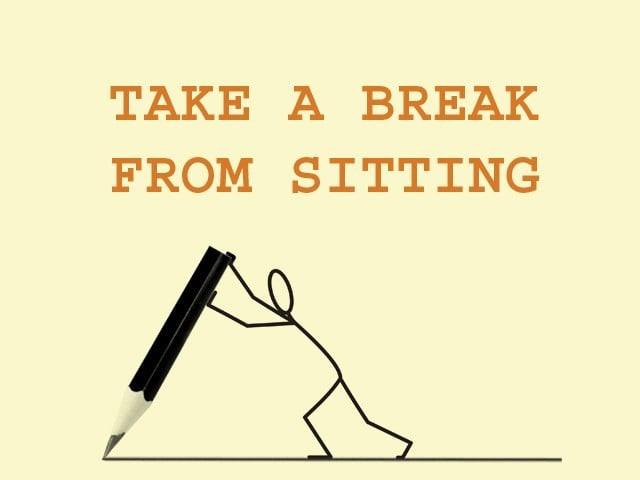Ways sitting all day deteriorates health
Sitting around for long periods at a stretch isn’t really good for your body

Sitting around for long periods at a stretch isn’t really good for your body. DESIGN: MANAHYL KHAN
It should come as no surprise that sitting around for long periods at a stretch isn’t really good for your body, but many are unaware of the serious issues sourced from a deskbound lifestyle. Whether you choose to sit all day or are required to by the logistics of your job, you may want to take a new approach to your workday and lifestyle. As compiled by nursingschools.net, medicaldaily.com and Men’s Health magazine learn how a sedentary life is affecting you.
Adversely affects the mind
An Australian study found that men who sat for more than six hours per day at work were 90 per cent more likely to report high levels of psychological distress, which further led to depression (caused by the lack of feel-good-hormone serotonin being secreted by the body). Feeling exhausted, nervous, restless, or hopeless were frequent side-effects that were recorded in the study. This correlation held true even when the researchers took into account their physical activity outside of work. Poorer mental health can cause people to be more inactive and sedentary behaviours can also directly influence the state of your mind, says study author Michelle Kilpatrick, PhD.
Raises risk of cancer
A German meta-analysis concluded that people who sat for the long periods (six hours or more) at a time each day were 24 per cent more likely to develop colon cancer than those who logged the least desk or couch time. And the risk was even higher for those who lounged out in front of the TV. When you sit, you’re not engaging in any light physical activity, like standing, walking, or just puttering about which in turn increases blood flow and active blood circulation — the lack of which can contribute to the development and growth of cancer cells, researchers say.
Slows metabolism
When you sit for an extended period of time, your body starts to slow and shut down on a metabolic level. Since you're not moving around, you're burning fewer calories and fewer fat burning enzymes are releasing and circulating through the body, inhibiting the fat burning process. This results in a sluggish metabolism and an overall feeling of lethargy. As a result, your energy levels crash, giving way to weight gain.
Raises risk of diabetes
Remaining seated too long can lead to steeper spikes in blood sugar. So, it’s not just dessert that has that effect on the body. A New Zealand study found that people’s insulin and glucose levels were significantly higher when they sat for nine hours straight than when they engaged in a little activity all at once before sitting, or when they broke up their activity into smaller, more frequent intervals. And that’s essential, since better blood sugar control is associated with decreased risk of developing diabetes. Researchers believe that frequent activity bouts burned more carbs, which helped clear glucose from the blood.
Raises cholesterol
Standing in queues won't sound so bad after you learn what other side effects sitting all day can have. Not only will it raise your blood sugar, but your cholesterol as well. Sitting causes enzyme activity in the body to drop by as much as 90 per cent, preventing those accommodating enzymes from grabbing that fat and emulsifying it to use it for energy. An inability to digest fat effectively results in raised cholesterol — that too the bad kind. In fact, after a few hours of sitting, healthy cholesterol plummets by 20 per cent putting you at risk of heart disease.
Affects the back
Your back probably doesn’t feel great after a day plonked in front of the computer, and that positioning plus the continued pressure on your spine might increase your risk of developing back issues down the line. A Penn State University study found that sitting without interruption for as little as four hours can cause compression of certain disks in your lower back. Over time, this pressure may lead to a herniated disk or overall disk degeneration — one of the most common causes of serious lower back pain.
Causes muscle weakness
When we remain stationary at our desks, the slack muscles do not contract effectively. It makes sense that moving less results in loss of muscle mass, leading to muscle weakness. One of the hardest hit muscles is the gluteus maximums. It is one of the largest muscles in the body and plays a big role in just about any movement you could want to do, so it's essential that it stays sturdy. Weakened gluteus muscles can result in hip bursitis and spinal column issues. Research published in the Mayo Clinic Proceedings found that when the participants repeatedly altered their positions every 15 minutes while sitting on a desk, they didn’t notice any adverse changes in their muscles. Another reason to justify being fidgety!
Shorter life span
Those who sit more than six hours a day are at an increased risk of early death from all causes — an average 40 per cent for women and 20 per cent for men, reported the American Cancer Society, whose researchers studied 123,216 people's health outcomes during a 14-year period. Those who don't exercise and sit all day are at a 94 per cent higher risk of premature death for women, and a 48 per cent higher risk for men. This is no joke for those who spend their days at a desk — it’s time to take hourly five minute walks, as suggested by the journal Medicine & Science in Sports & Exercise. The study concluded that sitting for extended time periods does major damage to human health that cannot be undone by time logged at the gym.
Compiled By: Umnia Shahid
Published in The Express Tribune, January 15th, 2015.
Like Life & Style on Facebook, follow @ETLifeandStyle on Twitter for the latest in fashion, gossip and entertainment.


















COMMENTS
Comments are moderated and generally will be posted if they are on-topic and not abusive.
For more information, please see our Comments FAQ